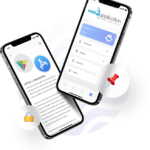
Maximize Productivity: How to Develop Apps for Corporate Use
- Mike
- March 6, 2024
- general information
- Develop Apps for Corporate Use
- 0 Comments
Are you looking to revolutionize your corporation’s efficiency and productivity? Developing apps tailored for corporate use could be the game-changer you’ve been seeking! In this blog post, we’ll delve into the essential steps and strategies to create impactful apps that cater specifically to businesses’ needs. From identifying goals to ensuring top-notch security, get ready to unlock the full potential of corporate app development. Let’s dive in!
Identifying the Needs and Goals of a Corporation
Before diving into app development, it’s crucial to understand the corporation’s specific needs and goals. Start by conducting thorough research and engaging with key stakeholders to gather insights. Identify pain points within the organization that can be addressed through a custom app solution.
Consider the company’s objectives through the app. Whether streamlining internal processes, enhancing communication, or improving customer engagement, aligning the app’s features with these goals is essential for success. Consider feedback from employees and managers to ensure all perspectives are considered in defining requirements.
By clearly defining the needs and goals early on, you set a strong foundation for developing an app that not only meets expectations but also drives tangible business results.
Choosing the Right Platform for App Development
When developing apps for corporate use, choosing the right platform is crucial. Before making a decision, consider factors like the target audience, app functionality, and budget.
iOS and Android are popular choices, each with its advantages and limitations. iOS offers a more streamlined user experience but comes with higher development costs. On the other hand, Android has a larger market share but can be fragmented across different devices.
Cross-platform development tools like React Native or Flutter provide cost-effective solutions by allowing developers to write code once and deploy it on multiple platforms. However, they may have limitations regarding performance or access to native features.
Selecting the right platform will depend on your specific requirements and goals for the corporate app you aim to develop. Choose wisely to ensure compatibility, scalability, and optimal user experience for your target audience.
Essential Features for Corporate Apps
When developing apps for corporate use, it’s crucial to include essential features that cater to businesses’ specific needs. One key feature is seamless integration with existing software systems, which ensures smooth workflow and data accessibility across platforms.
Another vital aspect is customizable user permissions, allowing administrators to control access levels based on organizational roles. This enhances security and confidentiality by limiting the exposure of sensitive information.
Incorporating analytics tools can provide valuable insights into app usage patterns and performance metrics. This data-driven approach enables companies to make informed decisions and optimize productivity.
Moreover, incorporating collaboration features like real-time messaging and file sharing promotes team communication and project coordination, fostering a collaborative work environment conducive to innovation and efficiency.
Prioritizing scalability ensures that the app can accommodate growth and evolving business requirements. By including these essential features, corporate apps can effectively streamline operations and maximize productivity for organizations of all sizes.
Security and Privacy Considerations for Corporate Apps
When developing apps for corporate use, security and privacy considerations are paramount. Protecting sensitive company data is crucial to maintaining trust with users. Implementing robust authentication measures such as multi-factor authentication can help prevent unauthorized access to the app.
Encryption of data both in transit and at rest is essential to safeguard information from potential breaches or cyberattacks. Regular security audits and updates should be conducted to proactively identify and address any vulnerabilities. Depending on the nature of the corporate app, it’s also necessary to comply with industry regulations like GDPR or HIPAA.
Incorporating features like role-based access control can limit permissions based on user roles within the organization, enhancing overall security. Additionally, educating employees about best practices for securely using the corporate app can further mitigate risks associated with human error.
Corporations can instill confidence in their app users while prioritizing security and privacy considerations during the development process while protecting valuable business assets from potential threats.
Testing and Launching Your App
Testing and launching your corporate app is a crucial phase in the development process. Conduct thorough testing to ensure the app functions seamlessly across various devices and platforms. Utilize test groups to gather feedback on user experience, performance, and functionality.
Before launching:
1. Create a strategic marketing plan to generate excitement among potential users.
2. Leverage social media platforms, email campaigns, and press releases to reach your target audience.
3. Consider offering exclusive access or promotions to incentivize downloads upon launch.
Once your app is ready for release, please submit it to the respective app stores while adhering to their guidelines and requirements. Monitor its performance post-launch by tracking key metrics such as downloads, engagement rates, and user feedback. Continuously optimize based on insights gathered from analytics tools for ongoing success.
Maintaining and Updating Your Corporate App
Once your corporate app is launched, the work doesn’t stop there. Consistent maintenance and updates are crucial to ensure its continued success. Regularly monitoring user feedback and performance metrics can help identify areas for improvement.
Maintaining a corporate app involves fixing any bugs or issues that may arise to provide users with a seamless experience. Staying current with software updates and security patches is essential to protect sensitive data.
Updating your app periodically keeps it relevant in an ever-changing digital landscape. Introducing new features or enhancements can attract more users and keep existing ones engaged. Listening to customer feedback is critical to understanding their needs and adapting the app accordingly.
By prioritizing maintenance and updates, you demonstrate a commitment to providing value to your users while staying ahead of the competition.
As you embark on your journey to develop apps for corporate use, remember the importance of identifying needs and goals, choosing the right platform, integrating essential features, prioritizing security and privacy considerations, and testing rigorously before launch. By following these steps diligently and staying attuned to industry trends and best practices through effective app development for corporate environments, you can maximize productivity.


